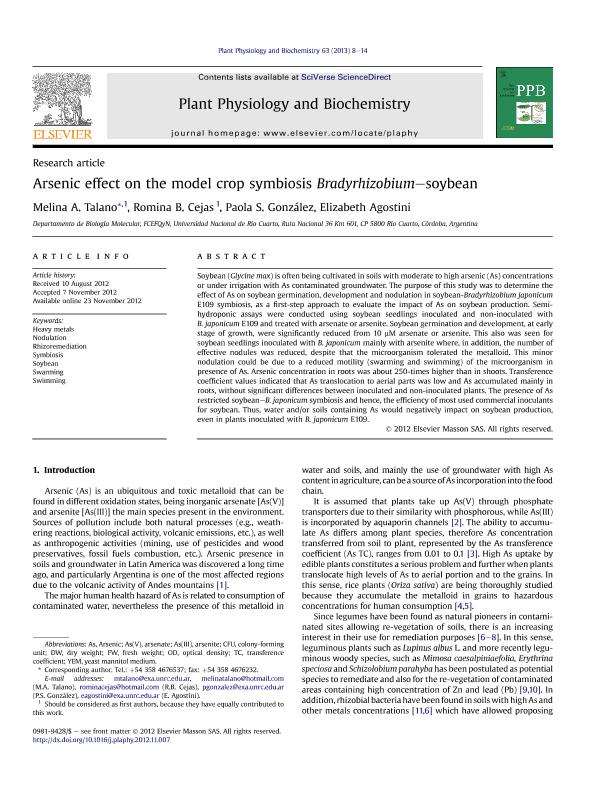Artículo
Arsenic effect on the model crop symbiosis Bradyrhizobium–soybean
Fecha de publicación:
02/2013
Editorial:
Elsevier France-editions Scientifiques Medicales Elsevier
Revista:
Plant Physiology and Biochemistry
ISSN:
0981-9428
Idioma:
Inglés
Tipo de recurso:
Artículo publicado
Clasificación temática:
Resumen
Soybean (Glycine max) is often being cultivated in soils with moderate to high arsenic (As) concentrations or under irrigation with As contaminated groundwater. The purpose of this study was to determine the effect of As on soybean germination, development and nodulation in soybean-Bradyrhizobium japonicum E109 symbiosis, as a first-step approach to evaluate the impact of As on soybean production. Semi-hydroponic assays were conducted using soybean seedlings inoculated and non-inoculated with B. japonicum E109 and treated with arsenate or arsenite. Soybean germination and development, at early stage of growth, were significantly reduced from 10 μM arsenate or arsenite. This also was seen for soybean seedlings inoculated with B. japonicum mainly with arsenite where, in addition, the number of effective nodules was reduced, despite that the microorganism tolerated the metalloid. This minor nodulation could be due to a reduced motility (swarming and swimming) of the microorganism in presence of As. Arsenic concentration in roots was about 250-times higher than in shoots. Transference coefficient values indicated that As translocation to aerial parts was low and As accumulated mainly in roots, without significant differences between inoculated and non-inoculated plants. The presence of As restricted soybean–B. japonicum symbiosis and hence, the efficiency of most used commercial inoculants for soybean. Thus, water and/or soils containing As would negatively impact on soybean production, even in plants inoculated with B. japonicum E109.
Palabras clave:
HEAVY METALS
,
NODULATION
,
RHIZOREMEDIATION
,
SOYBEAN
,
SWARMING
,
SWIMMING
,
SYMBIOSIS
Archivos asociados
Licencia
Identificadores
Colecciones
Articulos(CCT - CORDOBA)
Articulos de CTRO.CIENTIFICO TECNOL.CONICET - CORDOBA
Articulos de CTRO.CIENTIFICO TECNOL.CONICET - CORDOBA
Articulos(CIQUIBIC)
Articulos de CENTRO DE INVEST.EN QCA.BIOL.DE CORDOBA (P)
Articulos de CENTRO DE INVEST.EN QCA.BIOL.DE CORDOBA (P)
Citación
Talano, Melina Andrea; Cejas, Romina Beatríz; González, Paola Solange; Agostini, Elizabeth; Arsenic effect on the model crop symbiosis Bradyrhizobium–soybean; Elsevier France-editions Scientifiques Medicales Elsevier; Plant Physiology and Biochemistry; 63; 2-2013; 8-14
Compartir
Altmétricas




